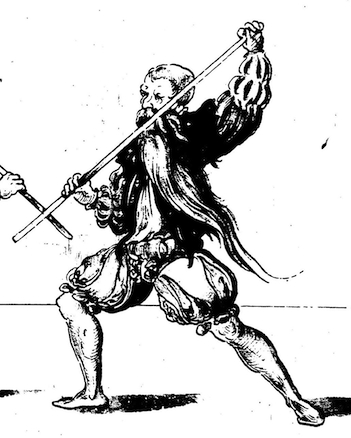|
I encounter a great deal of first time students of
historical fencing over the age of 40. They want to become involved in
practicing this craft, and are typically eager to learn about
Renaissance martial arts, but often become slightly discouraged at the
physical challenge involved, and the historically youthful nature of
armed combat itself, not to mention the vigorous approach the ARMA
promotes and the standards we try to maintain. The first thing I tell
them is that learning is a continual process, and with maturity comes
greater appreciation of that process.
At the same time, over time people often accumulate a plethora of
physical habits and movement patterns that must be overcome if they are
to legitimately develop real skill. While being able to jump and bounce
around with adolescent energy is certainly a benefit, the mental
aspects of this martial discipline are the same for everyone. Indeed,
these arguably count for more than does the affects of any natural
physical decline comparative to when an older student was 20 years
old. As the master Vadi wrote in the 1480s, “Cunning defeats any
strength.”
|

1486 - "Combat Between the Actor and Age"
|
|
 From
his 1611 treatise on the rapier, the Fechtmeister, Michael Hundt,
astutely declared: “Many a man will say, that skill in weapons is good,
and one of the principallest things that belongeth to a man, yet
themselves altogether unskilfull; in their youth they thinke it too
soone to learne, and in age too late, yet when they are wronged, they
would give any thing, that they were able to answere their enemy without
feare or hurt, as hee which is skilfull in his weapon may doe.”
Hundt later adds, “a little skill is a great help at a time of need,
which if thou hast not obtained in thy youth, then be not ashamed to
learne when thou art olde” From
his 1611 treatise on the rapier, the Fechtmeister, Michael Hundt,
astutely declared: “Many a man will say, that skill in weapons is good,
and one of the principallest things that belongeth to a man, yet
themselves altogether unskilfull; in their youth they thinke it too
soone to learne, and in age too late, yet when they are wronged, they
would give any thing, that they were able to answere their enemy without
feare or hurt, as hee which is skilfull in his weapon may doe.”
Hundt later adds, “a little skill is a great help at a time of need,
which if thou hast not obtained in thy youth, then be not ashamed to
learne when thou art olde”
More importantly, I like to remind mature students of the wisdom of the
English Master, Joseph Swetnam, from his 1617 fencing treatise, the Schoole of the Noble and Worthy Science of Defence,
covering the backsword, staff, and rapier. Swetnam advised: “a little
skill is a great help at a time of need, which if thou hast not
obtained in thy youth, then be not ashamed to learn when thou art old.”
Swetnam added further: “Many a man will say, That skill in
weapons is good, and one of the principallest things that belongeth to
a man, yet themselves altogether unskillful; in their youth they think
it too soon to learn, and in age too late, yet when they are wronged,
they would give any thing, that they were able to answer their enemy
without fear or hurt, as he which is skilful in his weapon may
doe.”
 Finally, he recommended one should, “never leave studying and
practising till you come to the ground, and until you have sounded into
the depth of your Art.” His wisdom rings again today. It reminds
us that such a view was nothing new in Western martial culture.
Rephrasing the Roman historian, Sallust, by way of Vegetius, the
chivalric-minded Christine de Pisan wrote in 1410: “It is better, that
young men should be excused for not having entirely mastered the
martial art than that they should be reproached in old age for never
having known it.” So true.
Finally, he recommended one should, “never leave studying and
practising till you come to the ground, and until you have sounded into
the depth of your Art.” His wisdom rings again today. It reminds
us that such a view was nothing new in Western martial culture.
Rephrasing the Roman historian, Sallust, by way of Vegetius, the
chivalric-minded Christine de Pisan wrote in 1410: “It is better, that
young men should be excused for not having entirely mastered the
martial art than that they should be reproached in old age for never
having known it.” So true.
“Be not wise in thine own conceit, in thinking that thou hast learned all the skill which is to be learned already,
farre deceived are thou if thou thinks so, for if thou live (til) thou art olde, yet thou mayest learne still.”
- Master Joseph Swetnam, 1617
|

